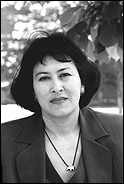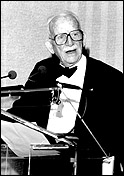on campus
Medicine woman
 PHOTO: Joseph Mehling
PHOTO: Joseph Mehling |
|
When they first arrive at university, native students often experience culture shock. The people they deal with in this new environment and the values they hold can be jarringly at odds with what the native students experienced within their communities.
Dr. Lori Arviso Alvord knows all about that.
The first Navajo woman to become a surgeon, Alvord struggled at times to reconcile her aboriginal beliefs with Western medical practices -- the Navajo are strongly resistant to any surgical procedures involving the removal of organs, for instance. Navajos also traditionally avoid touching and eye contact, and touching a dead body is strictly taboo.
But the Navajo might well have a better understanding of the roles that emotional well being and faith play in promoting good health.
Today, Alvord is an assistant professor of surgery at Dartmouth Medical School. She is also the medical school's associate dean for student and minority affairs and the co-author of The Scalpel and the Silver Bear, a recent book that recounts her life and describes her approach to medicine.
Alvord combines modern medicine with the traditions of her Navajo heritage, blending high tech surgical skills with an emphasis on establishing trusting relationships with patients.
According to the Weekly Wire, Alvord "has become somewhat of a New Age hero for her efforts to restore spiritual concerns to the mainstream healing arts."
Alvord will discuss her views and experiences on Friday, September 22, at 3pm in Room 232 of the Stephen Leacock Building. Her talk is organized by the First Peoples' House, with support from the McGill Associates.
Going to the dogs
 |
|
They may not have won the fourth Robot Dog World Soccer Championships, held last month in Melbourne, but the McGill team didn't come back with their tails between their legs. "The dogs didn't do anything stupid," notes Jeremy Cooperstock, "which is significant when you consider the level of problems, especially the vision issue."
Cooperstock, professor of electrical and computer engineering, is one of the three professors involved in helping students program the Sony-made electronic canines. The other two are mechanical engineering professor Martin Buehler and computer science professor Gregory Dudek.
"As humans, we take vision for granted. But the robot has to consider the quality of image provided by its computer. That's why two thirds of our brain cells are devoted to vision!" notes Cooperstock.
While engineering students David Germain, Guillaume Marceau and Andrew Ladd spent hundreds of hours writing the software (that is transferred to the pug-size dog via a rectangular diskette inserted beneath the dog's tail), they weren't prepared for the light conditions on the field.
"The goal and the ball looked like the same colour to the dogs," said Cooperstock, explaining that while 95 percent of "the code" is done here, all 11 teams had to do some recalibrating of their colour fields.
On the field, the RedDogs were trounced, like everyone else, by the University of New South Whales. "They were like the storm troopers in Star Wars," says Cooperstock. With their ability to move around on their elbows, the Australian dogs had far better control of the ball than the other teams, he explains.
But McGill did respectably against the University of Essex, defeating the first-time competitors in a penalty round, scoring the game's only goal. In the quarter-finals they lost to last year's champs, the French team, after leading 2-1 in the first half. Vision problems in the second half proved their downfall.
For Guillaume Marceau, winning is only icing on the cake; it's the exchange with the other teams that's interesting. "It's a competition but it's also research. The point is to have better and better soccer for everyone."
Hailing Humphrey
 |
|
Anyone within walking distance of the Nahum Gelber Law Library might want to drop in and spend some time finding out about an honest-to-goodness hero -- a local one to boot.
An exhibition currently on display celebrates the late John Humphrey, a long-time McGill law professor and the author of the first draft of the United Nations' Declaration of Human Rights, a document described by Russian novelist Alexander Solzhenitzyn as "the greatest accomplishment of the UN."
While Humphrey's achievement is touted today, his role was unrecognized for decades, even by McGill colleagues. French human rights advocate René Cassin was the man widely credited with composing the first draft.
"What Humphrey didn't have was proof. He didn't have the first drafts -- handwritten notes and typed drafts with handwritten changes," says John Hobbins, associate director of the Libraries. Through a quirk of fate, those papers ended up in Hobbins's hands.
Humphrey left McGill in 1946 to become the first director of the United Nations Division of Human Rights, a position he held for 20 years. It was there that he played a leading role in creating the Declaration.
When he left the UN to return to McGill, Humphrey donated a collection of UN-related papers to the University -- including the first drafts.
The significance of the documents went unnoticed for years until they came to the attention of Hobbins, who was then acting law librarian. After examining the documents thoroughly and comparing them to Cassin's first efforts on the Declaration, Hobbins realized Humphrey was, in fact, the author of the first draft of the Declaration.
To the consternation of French officials and scholars, Hobbins published his findings and set the record straight.
The exhibition, Citizen of the World: John Peters Humphrey and the Universal Declaration of Human Rights, was created by the National Arts Centre in 1998 and donated to the McGill University Archives in 1999. Former McGill students Kate Corbin and Heidi Burgess updated and modified the exhibition and Hobbins has made major contributions to it as well.
Among the items on display are copies of Humphrey's original drafts and correspondence between Humphrey and such noteworthies as Eleanor Roosevelt and F.R. Scott.
on the move
Professor Martha Crago from the School of Communication Sciences and Disorders is the new interim dean of the Faculty of Graduate Studies and Research. Crago had been the associate vice-principal (graduate studies) for the faculty.
Professor Pierre Bélanger will continue as the vice-principal (research), but is no longer dean of the faculty. In a memo sent out this summer, Principal Bernard Shapiro explained that the jobs of vice-principal and dean were separated "to optimize the efficiency of our administrative structures in a fast changing research environment and to ensure the best use of our human resources and competencies at the senior management level." He added that he would be consulting the McGill community for their thoughts on the organization of the faculty.
Mr. Real Del Degan is the new director of the Office of the Vice-Principal (Academic). Reporting to Vice-Principal (Academic) Luc Vinet, Del Degan will oversee the management of the various operations associated with academic affairs. He formerly served as associate director of the University Planning Office.
Ms. Danielle Nadon has been appointed for two years to be the new director of Pension Management (Administration). She will be responsible for managing the administration and benefits of the Pension Plan, as well as the day-to-day administration of the Pension Management Office. Nadon has experience in managing pension plans and benefits and has held positions as an actuarial and financial analyst for Hoechst Celanese Canada, and as a consultant with William M. Mercer Ltd.
Mr. Horst Bitschofsky retired from his position as general manager of the McGill Bookstore over the summer. Bitschofsky was once named Canadian bookseller of the year.
Ms. Patricia Shaw, a student adviser in the Student Affairs Office of the Faculties of Arts and Science, has left McGill to become the vice-president of student services for Dalhousie University. Shaw leaves McGill on a high note, having earned the Outstanding Adviser award from the National Academic Advising Association (NACADA) for her advising work at the University.
Ms. Isolde Lagacé left McGill to become the director of the Conservatoire de musique de Montréal. Lagacé was the director of events and publicity for the Faculty of Music for eight years.
Professor Paul Lasko, a leading expert on the genetic structure of the fruit fly Drosophila -- particularly in terms of the development of germ cells and proteins -- is the new chair of the Department of Biology, succeeding Don Kramer.
Ms. Jean Lenzi has retired from her position as coordinator of McGill Summer Studies. Ms. Denise Fekete has also retired from her job as administrative secretary for McGill Summer Studies. The office's new coordinator is Ms. Claudette Lapierre, who was the program administrator for the Department of General Studies at the Centre for Continuing Education.
Ms. Charlotte Cloutier has left her position as director of development for the Faculty of Management to become the executive director of the Fondation de Université de Sherbrooke.
Professor Glenn Cartwright from the Department of Educational and Counselling Psychology, is the new associate dean (information technology and continuing education) for the Faculty of Education. Cartwright studies the educational implications of new technologies.
Ms. Jill Barker is the new fitness coordinator for the Department of Athletics. She will be responsible for the department's Active Living program, which features non-credit physical courses for staff and students. A certified fitness leader and personal trainer, Barker has worked as a fitness instructor and coach with the Lester B. Pearson school board and is a weekly columnist with The Gazette in the area of fitness and recreation.

